Üsküdarlı Araştırmacılar Endonezya G20/N20 Zirvesinde…
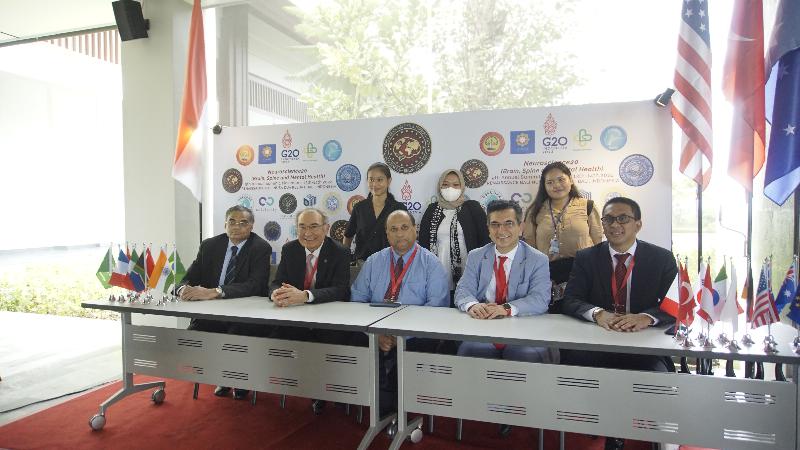
Sinirbilim alanında küresel ölçekte seçkin bilim insanlarının yer aldığı Beyin Haritalama ve Tedavileri Derneği (Society for Brain Mapping and Therapeutics – SBMT) tarafından düzenlenen G20 – Neuroscience20 (BRAIN- SPINE- MENTAL- HEALTH) zirvesinin 9’uncusu Endonezya / Bali’de yapıldı. Üniversite olarak Türkiye’den tek Üsküdar Üniversitesinin katılım sağladığı Zirvede Prof. Dr. Nevzat Tarhan açılış konuşması gerçekleştirdi. Nöroteknoloji odaklı çalışmalarıyla uluslararası araştırmacılarca ilgi görmenin ve referans adres olmanın kendilerini mutlu ettiğini belirten Tarhan’a Endonezya’da bestseller listesine giren kitapları dolayısıyla “Bestseller” ödülü de takdim edildi. Türkiye’den iki bilim insanı… Konferansa Türkiye’den tek katılım sağlayan üniversite Üsküdar Üniversitesi olurken Kurucu Rektör Prof. Dr. Nevzat Tarhan ve beraberindeki araştırmacılardan Üsküdar Üniversitesi Öğretim Üyesi Doç. Dr. Türker Tekin Ergüzel yürüttükleri çalışmalara ilişkin zirve kapsamında sunum gerçekleştirdi. Bilim liderlerinin gündeminde kanser, nöroteknoloji var… Prof. Dr. Nevzat Tarhan başkanlığında ME+ Brain Initiative, Societyfor Brain Mapping and Therapeutics (SBMT) adına Dr. Babak Kateb, Hindistan Brain Initiative adına Sandip Chatterjee, Asia – Pasific adına Dr. Asra Al Fauzi ve Sunder Vakfı Başkanı Keerthy Sunder zirve kapsamında N20’de açılış konuşmaları gerçekleştirdi. Bilim insanlarının gündeminde ise; Kanser Tedavisi, İntihar Önleme, Nöroteknoloji, Bağımlılık Önleme ve Giyilebilir Teknolojiler başlıkları vardı. Türkiye’de yürütülen çalışmalar dikkat çekti… Dünya basınında da geniş yer bulan zirve kapsamında “Theta Burst and Neuromodulation Applications” başlıklı sunumuyla oturum başkanı Prof. Nevzat Tarhan ve “AI Based Neuroscience Applications and NP Model” sunumuyla Doç. Dr. Türker Tekin Ergüzel çalışmalarını paylaştı. Nöroteknoloji odaklı çalışmaları uluslararası araştırmacıların ilgisini çekerken Prof. Nevzat Tarhan sunumunda nöromodülasyon tekniklerini, rTMS’in elektriksel aktiviteyi nasıl etkilediğine dikkat çekti. Tarhan, depresyon, OKB tedavisinde ve komorbid psikiyatrik hastalıklarda kullanımını, yan etkilerini ele aldı. NP Beyin Hastanesinin bağımlılık, rTMS theta burst protokollerini ve nöronavigasyon destekli tedavi uygulamalarını 9 farklı ülkeden araştırmacılar ve eş zamanlı olarak Society for Brain Mapping and Therapeutics (SBMT) Youtube kanalı üzerinden olarak izleyicileri ile paylaştı. Yapay Zeka destekli hastalık sınıflandırma modeli… Öte yandan Doç. Dr. Türker Ergüzel de NP Beyin Hastanesi için tasarlanan ve Prof. Nevzat Tarhan tarafından patent başvurusu yapılan Yapay Zeka destekli hastalık sınıflandırma modelinin ilk versiyonu “NP Model” sunumunu gerçekleştirdi. Özellikle artan veri çözünürlüğü ve boyutu ile birlikte yetersiz kalan geleneksel sınıflandırma algoritmaları yerine kullanılan LSTM, CNN mimarileri ile tasarlanan hastalık sınıflandırma modeli OKB – Sağlıklı Kontrol grubu için ve Bipolar – Sağlıklı Kontrol grupları için external validation işlemleri ile simüle edilerek araştırmacılar ile paylaşıldı. Tarhan: “Çalışmalarımızla ülkemizde referans adres olmak bizi mutlu ediyor” Üsküdar Üniversitesi ve NP Beyin Hastanesinin Nöroteknoloji odaklı çalışmalarının uluslararası araştırmacılar tarafından yakın ilgi görmesinin kendilerini çok mutlu ettiğini, ülkemizin bu alanlardaki çalışmalarının referans adres olmaktan ise mutluluk duyduklarını belirten Tarhan’a bir de ödül takdim edildi. Yazar Prof. Dr. Nevzat Tarhan’a Bestseller ödülü verildi “Rumi Terapi” ve “İnanç Psikolojisi” kitapları Endonezya’da “Bestseller” listesine giren Tarhan’a “Bestseller” ödülü takdim edildi. Tarhan’a ödülünü G20 / N20 zirvesinde “Indonesian Neurosurgical Society” başkanı Joni Wahyuhadi tarafından verildi. Okurları tarafından “Bilim ve inancı birlikte harmanlanmasına dair etkileyici bir kitap” olarak değerlendirilen Tarhan’ın kitapları N20 delegasyon üyelerine Prof. Dr. Nevzat Tarhan’ın imzası ile paylaşıldı. * Zirveye ilişkin bilgilendirme sunumuna ulaşmak için tıklayınız. Üsküdar Haber Ajansı (ÜHA)
Chopra Foundation Movement Recognized by Leading Brain Mapping Society and Foundation at the “Gathering For The Cure” Gala
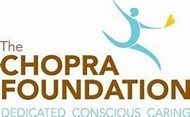
LOS ANGELES, March 9, 2022 /PRNewswire/ — The Chopra Foundation is pleased to announce it will be the recipient of the 2022 Beacon of Courage and Dedication Award from the Society for Brain Mapping and Therapeutics (SBMT) and International Brain Mapping Foundation (IBMF). This award is presented to the organizations and individuals who have raised awareness about neurological and neuropsychiatric disorders and impacted the science, technology and innovation for related patient care. On Friday, March 11, 2022, IBMF and SBMT will jointly hold the 19th annual “Gathering for the Cure Gala“ in Los Angeles, where Dr. Deepak Chopra, the pioneer in wellness and integrative medicine, will accept the award. Recognizing the Foundation’s vision and traction with its Never Alone movement, the award citation reads: The Society for Brain Mapping and Therapeutics recognizes your role in increasing awareness about Mental Health and Suicide Prevention through your “Never Alone Initiative”. We recognize and laud your efforts for highlighting the challenges faced by the COVID19 pandemic, wars across the globe, which impacts patients with neurological and neuropsychiatric disorders and their families. You continue to lead by example and continue to advocate for public support for brain research, aid for caregivers and care takers. Co-founded by Gabriella Wright, actor and international humanitarian, the Foundation’s NeverAlone initiative and related programs will inspire “Global healing through love in action and sharing the experience in joy so that We are Never Alone,” according to Dr. Chopra. Having recently turned 75, Dr. Chopra joyfully shares, “I have entered my final season, my winter.” As such, with a renewed focus on service, Dr. Chopra has engaged a new team to lead the future of the Chopra Foundation including CEO Poonacha Machaiah, COO Justin Nahama, and renowned philanthropic expert Caren Croland Yanis, former Executive Director of the Oprah Winfrey foundations. Foundation COO Justin Nahama, a Marine veteran and autism parent, says “Veterans and families with impacted children are incredibly lucky for the important trails blazed by SBMT and IBMF—under the vision and leadership of Dr. Kateb—to support caregivers during a lifetime of service.” Nahama continues, “The Chopra Foundation is proud to partner with SBMT and IBMF to expand its NeverAlone movement globally and advance the diagnostics and therapeutics for patients with neurological and neuropsychiatric challenges.” The Gala will unite scientists, technologists, policymakers, and inspiring individuals who have impacted the field of neuroscience globally. Over 450 industry-leading scientists, celebrities, healthcare executives, surgeons and engineers will be celebrating multiple award presentations to their colleagues. The Joint Chief of Staff of the US Armed Forces, General Mark Milley, will be also receiving an award for the heroic effort to serve and protect millions of Americans during the COVID19 pandemic. Over the past 20 years, the SBMT and IBMF have been on the forefront of neuroscience policy, scientific discoveries and technological development in the field of clinical and translational neuroscience. The foundation has been bringing state-of-the-art science and technology to wounded soldiers, veterans, and civilians. Both SBMT and IBMF have been instrumental in both the design and formulation of former President Obama’s BRAIN initiative, G20 Summit Brain Initiative/ Neuroscience 20 (Brain, Spine and Mental Health) and California’s Brain Technology and Innovation Park Initiative. For more information on the Gala and its program schedule: https://www.worldbrainmapping.org/Annual-Awards-Gala/ https://www.worldbrainmapping.org/Annual-Congress/Scientific-Program-Schedule To learn more about the Chopra Foundation: https://choprafoundation.org/ To learn more about SBMT: www.WorldBrainMapping.org To learn more about IBMF: www.BrainMappingFoundation.Org Contact:Kristen Marion623-308-2638 331559@email4pr.com SOURCE The Chopra Foundation
17th Annual World Congress of Society for Brain Mapping & Therapeutics
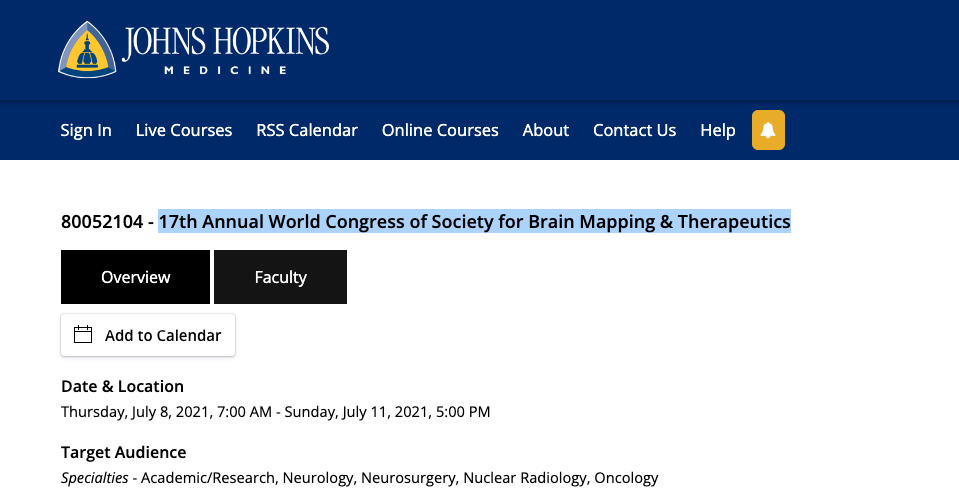
Date & LocationThursday, July 8, 2021, 7:00 AM – Sunday, July 11, 2021, 5:00 PM Target Audience Specialties – Academic/Research, Neurology, Neurosurgery, Nuclear Radiology, Oncology OverviewThe 17th Annual World Congress of SBMT will bring together physicians, scientists, policy makers, funding agencies, and industry to further the advances and applications in brain and spinal cord mapping and image-guided therapies (operative and non-operative). This conference will create a critical mass by introducing synergy among inter-disciplinary researchers and clinicians to further analyze brain function and the nervous system. For additional information: https://www.worldbrainmapping.org/Annual-Congress Objectives AccreditationACCREDITATION STATEMENTThe Johns Hopkins University School of Medicine is accredited by the Accreditation Council for Continuing Medical Education (ACCME) to provide continuing medical education for physicians. CREDIT DESIGNATION STATEMENTThe Johns Hopkins University School of Medicine designates this live activity for a maximum of 10.75 AMA PRA Category 1 Credits™ . Physicians should claim only the credit commensurate with the extent of their participation in the activity. Richard D. Abbey, PhDClinic DirectorAbbey Neuropsychology Clinic Orange Alem, PhDFounder/ScientistFieldLine Inc. Gabriel Altman, DCCo-ownerKinetix365 Michael Beyeler, PhDAssistant ProfessorUniversity of California, Santa Barbara Delia Cabrera DeBuc, PhDUniversity of Miami Gert Cauwenberghs, PhDProfessorUC San Diego Osman Cerezci, PhDProfUskudar UniversityIstanbul, Turkey Iype Cherian, MDDirector, Counselor General Member, Associate Chief Editor, ReviewerCleveland Clinic Yu Mike Chi, PhDCognionics, Inc. Gregory Clark, PhDAssoc. Prof.Univ. of Utah Justin Dye, MDAssistant ProfessorLoma Linda University Turker Tekin Erguzel, PhDUskudar UniversityIstanbul, Turkey Zhaoyang Fan, PhDAssociate ProfessorUniversity of Southern California Jeffrey Farkas, MDNYU Michael G Fehlings, MD, PhDProfessor of Neurosurgery/Vice Chair ResearchUniversity of Toronto ,Toronto, Canada DeAnn Fitzgerald, ODODDr. Fitzgerald & Associates Michael Flomenhaft, J.D.Flomenhaft Law Firm Brain Justice Dale Foster, PhDPresidentNeuroSource LLC Jenny Garbus, COT, CBISNeuro Vision Rehabilitation Institute Hugo Geerts, PhDCertara Robert Hariri, MD, PhDChairman FounderCelularity Heather HeitkotterGraduate StudentMedical College of Wisconsin Ryan M. Hill, PhDUniversity of NottinghamNottingham, United Kingdom Elliot Hogg, MDAssistant ProfessorCedars-Sinai Medical Center Keyne Johnson, MDOwner/CEOBrain and Spine Institute for Children Babak Kateb, MDChairman and CEOSociety for Brain Mapping and Therapeutics (SBMT) Spencer Kellis, PhDCalifornia Institute of Technology Jacob Koffler, PhDUCSD James Kozloski, PhDResearch Staff MemberIBM Research Christopher Lee, PhDUniversity of California San Diego Vivien Lee, MDNeurologistOhio State University Medical Center Kai-Uwe Lewandrowski, MDSurgeonCenter For Advanced Spine Care of Southern Arizona Mark Liker, MDAssistant ProfessorUniversity of Southern California Joel Lubar, PhDPRESIDENTSOUTH EASTERN NEUROFEEDBACK INST Codrin Lungu, MDNINDS, NIH Nancy J Major, MAVision TherapistCentral Coast Vision and Learning Shannon Mandel, PA-CMind Eye Institute Zoltan Mari, MDAssociate ProfessorJohns Hopkins University Eric Marvin, DOVirginia Tech Carilion Clinic Brian Mehling, MDOrthopedic Surgeon CMO, Blue Horizon InternationalBlue Horizon International Roger Miller, PhDProgram DirectorNational Institutes of Health Kelly Mills, MD Hiroyuki Mino, PhDProfessorKanto Gakuin UniversityYokohama, Japan Virendra Mishra, PhDAssociate StaffCleveland Clinic Lou Ruvo Center for Brain Health Martin M Mortazavi, MD, NeurosurgeonChairmanCalifornia Institute of Neuroscience Rebeca Perez-Alfayate, MD, PhD, NeurosurgeonNeurosurgeonHospital Clinico San CarlosMadrid , Spain Amy Pruszenski, ODDr.Visual Victory Training, PLLC Afsaneh Rabiei, PhDProfessor Mechanical and Aerospace EngineeringNorth Carolina State University Albert Recio, MDPhysicianKennedy Krieger Institute/ JHH Liana Rosenthal, MDAssistant ProfessorJohns Hopkins School of Medicine Terence Sanger, MDUCI Fabien Scalzo, PhDAssociate ProfessorPepperdine & UCLA Selim Seker, PhDUskudar Universityistanbul, Turkey Vishal Shah, PhDCEO and FounderQuSpin, Inc. Lingyan Shi, PhDAssistant ProfessorUniversity of San Diego Tony Spahr, PhDSr. Dir. Research & TechnologyAdvanced Bionics Noelle Stiles, PhDUSC Viktor Szeder, MD, PhDAssociate Clinical Professor of Radiology and NeurosurgeryUCLA Fabian Tai, OD Ambooj Tiwari, MDClinical Assistant ProfessorNYU School of Medicine Derek Tong, ODClinic DirectorCenter for Vision Development Optometry Inc. Gabor Toth, MDAssociate ProfessorCleveland Clinic Christopher Tyler, PhDSenior ScientistSmith-Kettlewell Eye Research Institute Suraj Upadhyaya, PhDMidwestern University Pablo Villablanca, MDUCLA Ryan R Walsh, MD, PhD, FAANAssociate ProfessorMuhammad Ali Parkinson Center at Barrow Neurological Institute Yiwen Wang, PhDAssistant ProfessorHong Kong University of Science and TechnologyKowloon, Hong Kong Danny JJ Wang, PhDProfessor of Neurology and Radiology; Director of Imaging Technology InnovationUniversity of Southern California Eric J Wang, MDAssistant ProfessorJohns Hopkins Medicine Robert Watkins IV, MDCo-DirectorMarina Spine Center Yuxiao Yang, PhDPostdocUniversity of Southern California Anthony T Yeung, MD, Clinical Professor of NeurosurgeryExecute DirectorInternational Intradiscal Therpy Society Gene J Yu, PhDUniversity of Southern California Theodoros Zanos, PhDAssistant ProfessorFeinstein Institutes for Medical Research Hekmat Zarzour, MD, Assistant ProfessorAssistant ProfessorJefferson University Yongxin Zhao, PhDAssistant ProfessorCarnegie Mellon University Zion Zibly, MD
Brain Mapping Foundation to award Montel Williams, Sahel Rose, Ken Fisher, Anthony Fauci, Robert Hariri, Sanjay Gupta, Saleem Abdulrauf, Ro Khanna, Eva Hsieh, Harrison Ford, Michael E. Phelps and many more luminaries at its 18th Annual Gathering for Cure Gala
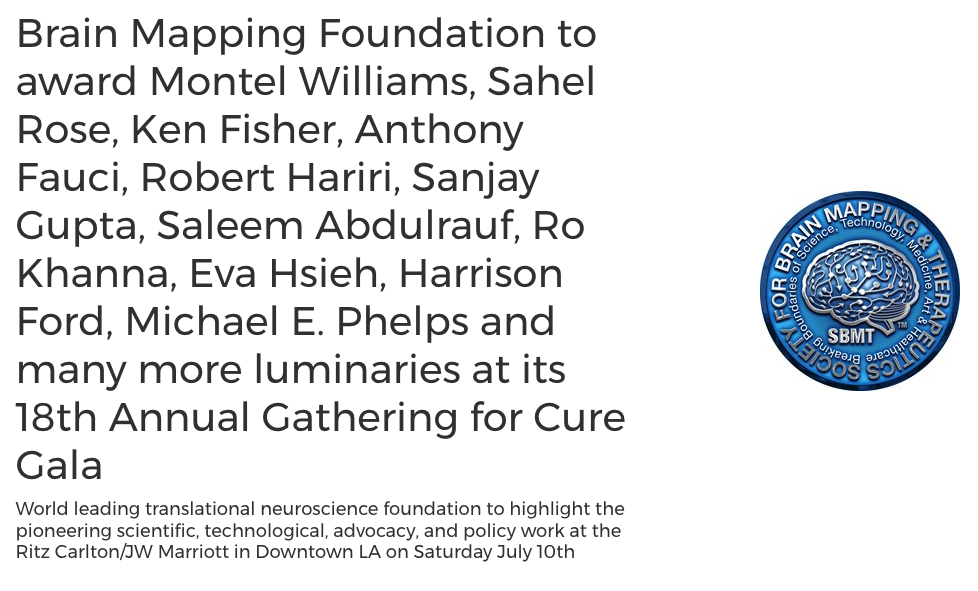
LOS ANGELES, July 7, 2021 /PRNewswire/ — Brain Mapping Foundation (BMF) was established in 2003 to help fast-tracking diagnostics and therapeutics for wounded soldiers, veterans, and civilians with neurological, spine, and neuro-psychiatric disorders. Since then, the organization has been pioneering lifesaving therapeutics and introducing trailblazing initiatives such as Neuroscience20 (Brain20, Spine20, Mental20) and Brain Technology and Innovation Park (BTIP) while celebrating pioneers in the fields. “BMF award banquet is like the Oscars for neuroscience. Annually, we identify pioneers in neuroscience, neurotech, policy, humanitarian, advocacy, and student recognitions” said, Dr. Babak Kateb, President of Brain Mapping Foundation. “We are honored to celebrate such remarkable individuals who have a passion for humanity and helping other. I am also honored to co-hots the gala with my remarkable co-host actress Gabriella Wright“. The 18th Annual Gathering for the Cure of the BMF will include a red-carpet interview with pioneering scientists, engineers, physicians, surgeons, policymakers, and technologists as well as celebrities who are raising awareness about neurological, spine and mental health. A worldly renowned musician Michael Fitzpatrick to perform at the event, with auctions and many other exciting entertainments will be included. To book your ticket please visit: https://www.worldbrainmapping.org/Annual-Awards-Gala/ About BMF: www.BrainMappingFoundation.Org Contacts: Keri Ann Kimball keriann@kimballentertainment.com C: 310-721-4912 O: 650-922-6259 SOURCE Society for Brain Mapping and Therapeutics
AIM MEDICAL ROBOTICS TO PRESENT AND EXHIBIT AT 18TH ANNUAL WORLD CONGRESS OF SOCIETY FOR BRAIN MAPPING AND THERAPEUTICS (SBMT)

Presentation by Dr. Julie Pilitsis, Chief Medical Advisor & Co-Founder, to take place on July 10th at 1:45 pm PSTPresentation by Dr. Greg Fischer, Chief Scientific Advisor & Co-Founder, to take place on July 11th at 4:45 pm PST FORT LAUDERDALE, Fla., July 7, 2021 /PRNewswire/ — AiM Medical Robotics, a leading developer of MRI-safe intraoperative robotics for neurosurgery, today announced that they will be presenting and exhibiting at the prestigious 18th Annual World Congress of Society for Brain Mapping and Therapeutics (SBMT), which will be held in Los Angeles on July 8th – 11th. The program will be featuring state-of-the-art science and technology in the field of neuroscience and neurosurgery, and it will have close to 900 presenters and 10 keynotes. The co-founders and inventors of AiM Medical Robotics, Dr. Greg Fischer of the Worcester Polytechnic Institute and Dr. Julie Pilitsis of the Albany Medical Center, will be presenting the latest updates on their NIH-funded research for brain tumor ablation during the SBMT scientific sessions. Additionally, Bob Cathcart, President & CEO of AiM Medical Robotics, and Dr. Jonathan Sackier, Director, will be meeting with clinicians and industry leaders during the Company’s exhibition at the Congress. “SBMT brings pioneers of neurosurgery and trailblazing companies together with game changing policy makers in order to rapidly fast track diagnostics, devices and therapeutics for patients with neurological, spine and neuro-psychiatric disorders; AiM Medical Robotics is one of the leaders in the emerging field of artificial intelligence-guided therapy” said, Dr. Babak Kateb, founding chairman of the board of directors & CEO of SBMT, President and Scientific Director of the Brain Mapping Foundation, Director of National Center for Nano-Bio-Electronics, and Director of Brain Technology and Innovation Park. Bob Cathcart commented, “We are extremely excited to have been asked to participate in this outstanding gathering of world leaders in Neurology. SBMT is at the forefront of discovery for the diagnosis and treatment of brain disorders. We are honored to have Dr. Fischer and Dr. Pilitsis participate in the scientific sessions to share their enthusiasm and the accomplishments that we have seen with our paradigm-shifting technology. Our MRI-compatible robotic system will give surgeons the ability to utilize MRI guidance for complex neurosurgical procedures. By combining the Real Time feedback of the MRI and the precision and accuracy of the robot, surgeons can confidently reach targets deep in the brain the first time every time.” About AiM Medical Robotics AiM Medical Robotics is a privately held biotechnology company currently focused on the development of MRI-compatible advanced robotics that are precision-focused and portable. You can follow AiM at www.aimmedrobotics.com and on LinkedIn at https://www.linkedin.com/company/aim-medical-robotics. Forward Looking Statements This release may contain forward-looking statements that are subject to risks and uncertainties. Such forward-looking statements may include but are not necessarily limited to statements that relate to the advancement and development of the company’s robot or technologies, when used herein, words such as “anticipate”, “being”, “will”, “plan”, “may”, “continue”, and similar expressions are intended to identify forward-looking statements. In addition, any statements or information that refer to expectations, beliefs, plans, projections, objectives, performance or other characterizations of future events or circumstances, including any underlying assumptions, are forward-looking. All forward-looking statements are based upon AiM Medical Robotics’ current expectations and various assumptions. AiM Medical Robotics believes there is a reasonable basis for its expectations and beliefs, but they are inherently uncertain. AiM Medical Robotics may not realize its expectations, and its beliefs may not prove correct. Actual results could differ materially from those described or implied by such forward-looking statements as a result of various important factors. Readers should not place undue reliance on the forward-looking statements, which reflect management’s view only as of the date hereof. AiM Medical Robotics undertakes no obligation to publicly revise these forward-looking statements to reflect subsequent events or circumstances. Contacts:Bob CathcartChief Executive OfficerAiM Medical Robotics, Inc.(862) 703-0253bcathcart@aimmedrobotics.com Investors:Doug NissinoffCorporate CommunicationsAiM Medical Robotics, Inc.(954) 204-6745IR@aimmedrobotics.com
Doctors Around The World Offer to Help Ukraine
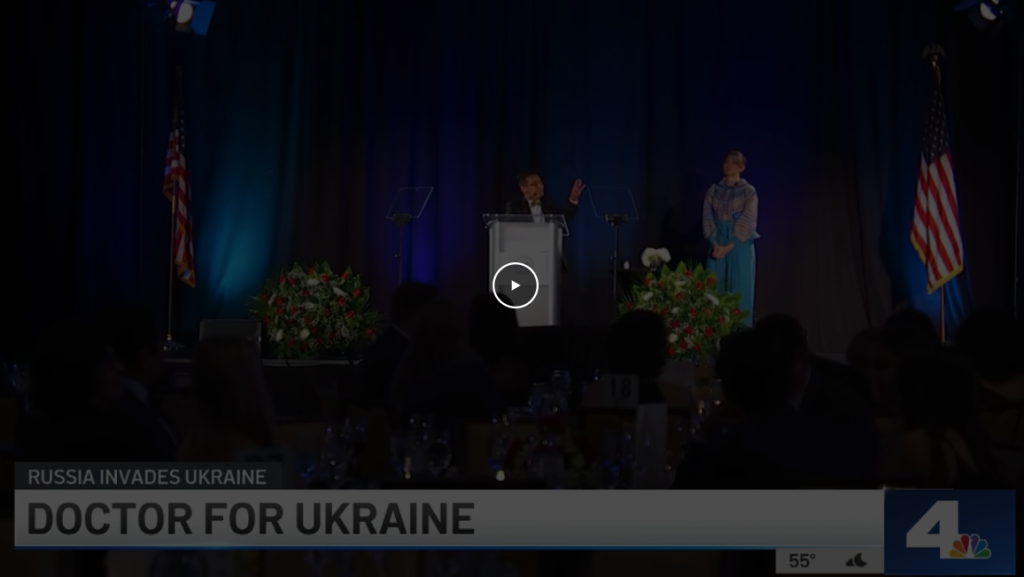
A network of more than 100,000 doctors from around the world are pulling together to help the people of Ukraine. Lauren Coronado reports for the NBC4 News at 11 p.m. on March 11, 2022.
Brian Mehling, M.D. presented at the Neuroscience 20 | SBMT virtual summit on November 21, 2020
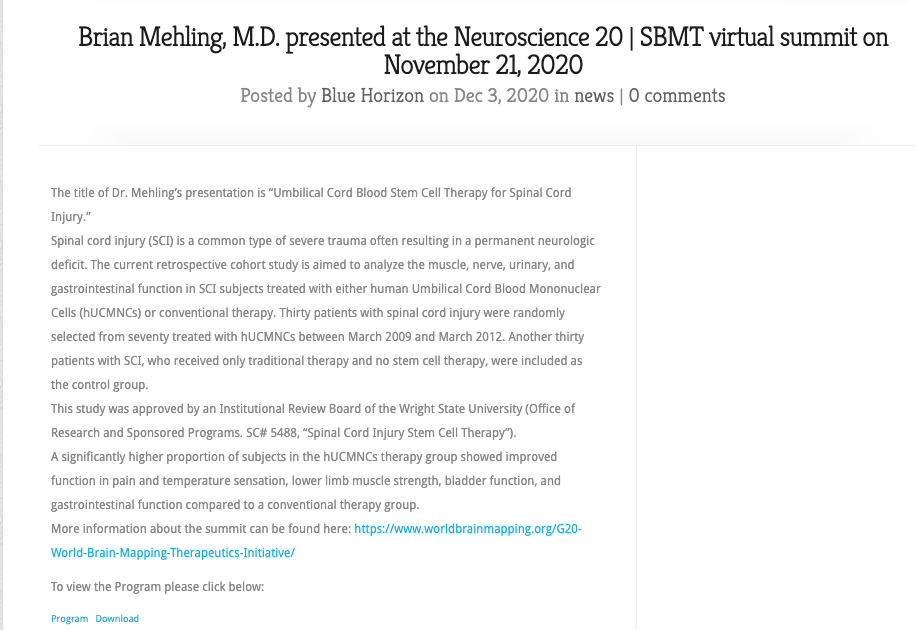
The title of Dr. Mehling’s presentation is “Umbilical Cord Blood Stem Cell Therapy for Spinal Cord Injury.”Spinal cord injury (SCI) is a common type of severe trauma often resulting in a permanent neurologic deficit. The current retrospective cohort study is aimed to analyze the muscle, nerve, urinary, and gastrointestinal function in SCI subjects treated with either human Umbilical Cord Blood Mononuclear Cells (hUCMNCs) or conventional therapy. Thirty patients with spinal cord injury were randomly selected from seventy treated with hUCMNCs between March 2009 and March 2012. Another thirty patients with SCI, who received only traditional therapy and no stem cell therapy, were included as the control group.This study was approved by an Institutional Review Board of the Wright State University (Office of Research and Sponsored Programs. SC# 5488, “Spinal Cord Injury Stem Cell Therapy”).A significantly higher proportion of subjects in the hUCMNCs therapy group showed improved function in pain and temperature sensation, lower limb muscle strength, bladder function, and gastrointestinal function compared to a conventional therapy group.More information about the summit can be found here: https://www.worldbrainmapping.org/G20-World-Brain-Mapping-Therapeutics-Initiative/ To view the Program please click below: ProgramDownload
Uskudar University represented Turkey at G20 7. Neuroscience Summit…
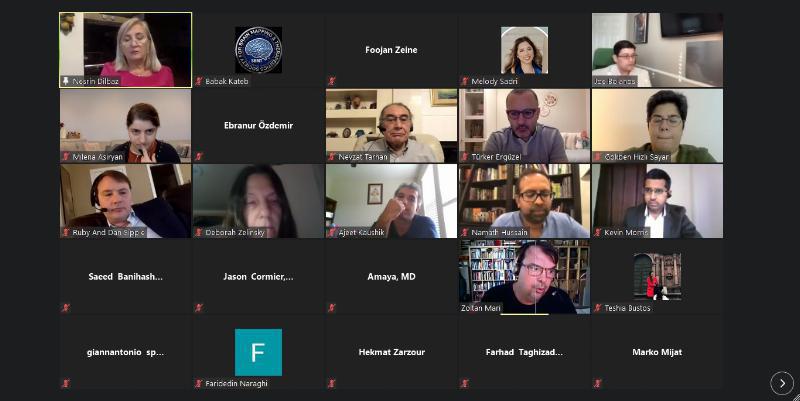
As in previous years, Uskudar University was the only Turkish university to represent Turkey at the G20 summit N20/Neuroscience20 (BRAIN20, SPINE20, MENTAL20 Health) Initiative this year. Covid-19 pandemic and its effects, which marked the year 2020, were discussed at the congress held online due to coronavirus measures. As in previous years, Uskudar University was the only Turkish university to represent Turkey at the G20 summit N20/Neuroscience20 (BRAIN20, SPINE20, MENTAL20 Health) Initiative this year. Covid-19 pandemic and its effects, which marked the year 2020, were discussed at the congress held online due to coronavirus measures. Psychiatrist Prof. Dr. Nevzat Tarhan, Founding Rector of Uskudar University, said that the biggest impact of the pandemic affecting the whole world will be loneliness. Tarhan warned that; “There will be an impact of loneliness after the pandemic” and said precautions should be taken. As Psychiatry Specialist Prof. Dr. Nesrin Dilbaz, was talking about her COH-FIT research conducted worldwide; Prof. Dr. Gökben Hızlı Sayar shared the results of the Coronaphobia survey conducted in Turkey with the world together.
FDA Green-Lights Clinical Trial For COVID-19 Coronavirus Treatment That ‘Flattens The Curve’ In Patients

Therapeutics startup Celularity announced Thursday morning that it has received FDA clearance to begin a clinical trial of a proposed stem-cell treatment for COVID-19. The approval of the New Jersey-based company’s IND application enables the company to begin a clinical trial with patients who have the disease. The company’s therapy, called CYNK-001 for now, uses “Natural Killer” (NK) cells, a form of white blood cells that wage war against cancer and viral infection, derived from placental stem cells. The company’s been developing similar treatments for several years against cancer and Crohn’s disease, several of which are being tested as well. The idea behind the therapy is that for patients who are starting to show symptoms, or who may be at risk for a more severe form of the disease, can receive an intravenous infusion of NK cells to bolster their immune response to the virus, says founder and CEO Robert Hariri. That’s because the additional NK cells help slow down the viruses’ ability to replicate within the body. It’s an approach he likens to social distancing—slowing the spread of COVID-19 so hospitals don’t get even more overwhelmed—within patients themselves. “By administering our NK cells to patients, we are acting to ‘flatten the viral titer curve,’ so the patient’s adaptive immune system can get in gear and do the job of clearing the virus,” he says. Celularity was cofounded by Hariri and X Prize Foundation chair Peter Diamandis in 2016 as a spinout of pharmaceutical company Celgene. About a decade before, the company had found itself in the business of collecting and storing umbilical cord blood from placentas after birth. The undifferentiated stem cells found in that blood offer a universal way to generate NK cells that potentially reduce risk of rejection or other complications. It’s a strategy that’s earned the company support from investors like Bill Maris at Section 32, Sorrento Therapeutics, and former Apple CEO John Sculley. According to Pitchbook, the company has raised over $327 million in backing to date. Forbes Daily: Get our best stories, exclusive reporting and essential analysis of the day’s news in your inbox every weekday.Sign Up You may opt out any time. By signing up for this newsletter, you agree to the Terms and Conditions and Privacy Policy The primary thrust of the company’s therapeutic efforts have been to leverage these treatments against forms of cancer such as myelomas and leukemia. But because NK cells are often involved in protecting the body against viruses, Hariri says he’s always looked to the company one day going after infectious disease. According to Hariri, it may take only a matter of days to see results from the first clinical trial of COVID-19 patients. That test will involve use of the treatment in a patient group of up to 86 people. If that’s successful, Hariri hopes those results will mean accelerating to a larger trial, and then, if all goes well, out to market. “This is a very easy product to deploy,” says Hariri. “We’re hopeful that if we get compelling enough data, the agency and the CDC and the NIH will work with us to scale up production.”
California To Hold Its First Large In-Person Medical Convention at the Los Angeles Convention Center on July 8-11, 2021
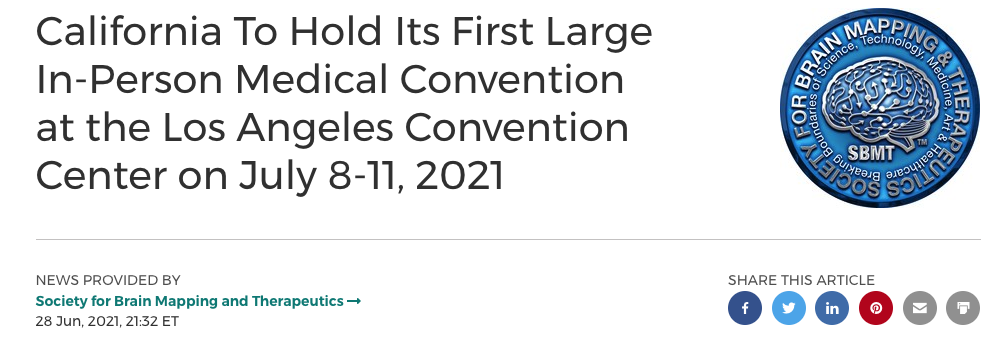
LOS ANGELES, June 28, 2021 /PRNewswire/ — The 18th Annual World Congress of the Society for Brain Mapping and Therapeutics (SBMT) will be the first major medical association to hold a large in-person convention in the state of California after the State’s reopening of the economy by the honorable Governor Gavin Newsom on June 15th. The program is jointly sponsored by Saint Louis University School of Medicine and Johns Hopkins University School of Medicine providing more than 20 hours of Continuing Medical Education accreditation. Attendees must be vaccinated or have a proof of negative COVID19 tests. Face coverings are optional for fully vaccinated attendees with a proof of vaccination record but mandatory for unvaccinated or partially vaccinated attendees. “We were the first medical association to shut-down the convention last year and announce the pandemic. Now, we are the first to hold an in-person and virtual (optional) convention in the state of California after its reopening”, said the executive director of SBMT, Dr. Vicky Yamamoto. The 18th Annual World Congress of SBMT will have close to 900 presenters and 10 keynotes including the Honorable Congressman Ro Khanna, Drs. Robert Hariri, Deepak Chopra, Martin Mortazavi, Andre Machado, Saleem Abdulrauf, Jason Cormier, Qin Wang, and John Adler. The convention will cover Parkinson’s Disease, Alzheimer’s Disease, brain cancers, spinal disorders, neuro-ophthalmology, neuro-optometry, neurotrauma and military medicine, neuro-psychiatric disorders, neurophysiology, neuroradiology, nanoneuroscience, AI and predictive modeling, stem cell and cellular therapeutics/immunotherapy, COVID-19 brain, virtual and augmented reality, neurovascular disorders, healthcare policy and neuro-engineering. The scientific program includes two bio-skill/cadaver labs for skull base surgery and spine surgery training. “NASA, Department of Defense and National Lab scientists are amongst elite teams presenting at the world class scientific convention, which is also aimed at fast tracking neurotechnology and neuro-therapeutic development” said a founding chairman of the board and CEO of SBMT, Dr. Babak Kateb. The program is made possible by generous support of the following organizations and companies, which will be at the exhibition hall: Fulgent Genetics, Hsieh Family Foundation, Chopra Foundation, Brain Mapping Foundation, Bill and Lee Wood Charitable Trust and Foundation, Brain Technology and Innovation Park (BTIP), Celularity, Mind-Eye Institute, Applied Neuroscience Inc, Medtronic, Orthofix, Legally Mine, AiM Med Robotics, Inspectra Thermal Solutions, Novocure, Telethon France, Olympus Medical , Portola Pharmaceuticals, Cognionics, Penumbra, Stryker, Boston Scientific, Raymond James Wealth Management, Cereset, BrainScope, Globus, MiRus Med, Nextim, National Skull-Base Foundation and many other industry leaders in the field and organizations. To register at this world class convention please visit: https://worldbrainmapping.site-ym.com/events/register.aspx?id=1524448&itemid=f524bd56-4b57-4273-b01a-9e0046a0155a For More information about SBMT please visit: www.WorldBrainMapping.Org Media Contact: SBMT PR Team 310-500-6196 or email: Melodi Sadri melody.sadri@brainmappingfoundation.org SOURCE Society for Brain Mapping and Therapeutics Related Links https://www.worldbrainmapping.org
